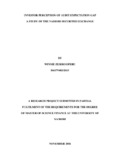| dc.contributor.author | Operu, Winnie Z | |
| dc.date.accessioned | 2017-01-09T09:10:40Z | |
| dc.date.available | 2017-01-09T09:10:40Z | |
| dc.date.issued | 2016 | |
| dc.identifier.uri | http://hdl.handle.net/11295/99884 | |
| dc.description.abstract | The study sought to establish investor perception of audit expectation gap. This was
informed by the well-publicised collapses of large companies and the eventual
incrimination of the external auditors, during recent time. This has highlighted the
audit expectation gap. There is a common viewpoint that for an individual who is
interested in a company, they should easily rely on the financial statements that have
been audited as an assurance of business viability. The individuals who invest in
companies trust that the information given by the external auditor acts as a guarantee
of a company’s financial condition. There thus seems to exist a relationship between
investor perception and the audit expectation gap, the narrowing or widening of this
expectation gap is thus pegged on investor understanding of the role of auditors.
The study made a comprehensive analysis of audit expectations on investors and
auditors’ own view of the expectations gap. The study utilized both analytical and
descriptive methodology to examine the gap between audit expectation and investors
perception. The study used a questionnaire as the key tool for collecting data.
Covariance and correlation matrices were used to identify how investors’ decisions
(market, usefulness, responsibility and nature of audit factors) were influenced by the
audit expectation.Statistical analysis was used to capture empirical data on all
variables explaining the audit expectations gap and to determine the factor with the
greatest impact on audit expectations gap. A second regression analysis was applied
to capture auditors’ responses concerning the audit expectations gap. It was therefore
a longitudinal study which sought to investigate the investor perception on audit
expectation gap by studying the Nairobi Securities Exchange. The study found out
that there is indeed an expectations gap in the role of external auditors in company
audits. The analysis shows that there is a positive correlation between audit
expectations gap and investor perception. The results from statistical analysis indicate
that audit expectation gap increases by 0.2378 when investor perception increases by
a unit. This basically explains the hypothesis of how investors will have a look on the
audited financial statement to allocate their investment resources. The findings on the
investor perception of audit expectations gap can be used to inform a number of
policy decisions at improve understanding of the work that auditor’s do. Future
researchers may focus on how improved stakeholder participation in the audit process
may reduce the investor expectations gap and how this can improve investor
understanding of what auditors actually do | en_US |
| dc.language.iso | en | en_US |
| dc.publisher | University of Nairobi | en_US |
| dc.rights | Attribution-NonCommercial-NoDerivs 3.0 United States | * |
| dc.rights.uri | http://creativecommons.org/licenses/by-nc-nd/3.0/us/ | * |
| dc.title | Investor Perception of Audit Expectation Gap a Study of the Nairobi Securities Exchange | en_US |
| dc.type | Thesis | en_US |



